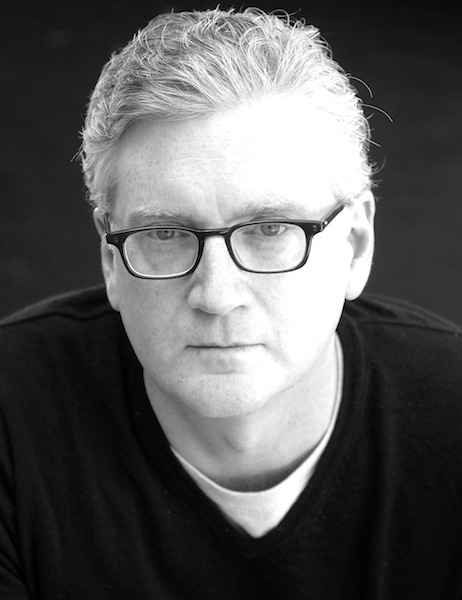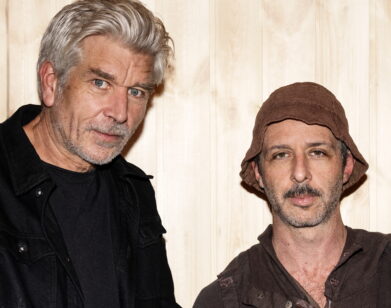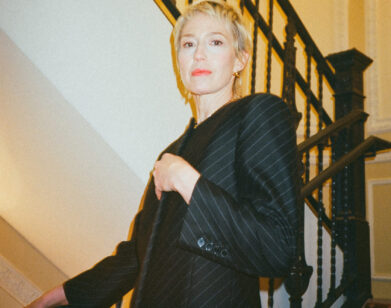Jonathan Dee’s Art of Apology

ABOVE: JONATHAN DEE. PHOTO CREDIT OF ULF ANDERSON.
Jonathan Dee’s latest novel, A Thousand Pardons (Random House), begins with a trip to a marriage counselor. The protagonist, Helen Armstead, is waiting for her husband Ben to return to their suburban New York home. They tell their daughter Sara they are going on a “date night.”
By the end of Chapter One, the Armsteads are filing for divorce and in danger of losing their house. Ben’s been accused of sexual assault, fired from his job at a white-shoe law firm, and committed to rehab. The previously home-based Helen has taken a job at a PR firm in Manhattan.
When he’s not writing novels, Dee teaches graduate writing programs at colleges across New York City, and it comes across in his work. Dee writes swiftly and smoothly. His last novel, the Pulitzer-nominated The Privileges (2010) captivates with the very first sentence—two words, “A Wedding!” The dissolution of the Armsteads’ marriage could be a book in and of itself, but Dee’s agile approach turns a familiar story into something much more intriguing.
EMMA BROWN: Helen’s PR philosophy is just to apologize. Do you think that really works?
JONATHAN DEE: Yeah, I think it does. I think Helen’s kind of stumbled on something there—much more by instinct than by training or experience—about what we want in the public sphere from people who are perceived to have done wrong. They have to make an offering out of themselves in order to be forgiven. You see that in the news constantly; done both the right way and the wrong way.
BROWN: What is the right way?
DEE: The most recent example I can think of, obviously, is Lance Armstrong, who got it all wrong. Who wanted to apologize strategically, instead of abjectly, the way Helen would’ve advised him to. What got me interested was the repetitive nature of it. There’s something so ritualized about it. Then the ritual needs to be reenacted very carefully and pretty frequently—Tiger Woods, and now Manti Te’o and Lance Armstrong, and a little earlier Anthony Weiner or Eliot Spitzer.
BROWN: You’d think people would be a little more hesitant about embarking on affairs with young women or visiting prostitutes.
DEE: [laughs] Yeah, everybody thinks that. Another big moment in terms of that feeling was David Petraeus: if the director of the CIA can’t get away with having a secret relationship, then what hope do you have? [laughs] It’s not really an original idea, but there’s something that goes along with power and celebrity that starts to make you feel like you’re impervious to certain forces that the rest of us have to live with. What would make Eliot Spitzer live the way that he was living as governor of New York? It just boggles the mind.
BROWN: Ben doesn’t seem to think he’s impervious to harm. It seems like he no longer cares.
DEE: Ben is a different story. He’s not a public figure; he’s not disgracing himself in any sphere other than his personal and professional one. I don’t want to make it sound too much like I’m telling people how to read the book, but what he’s doing, he’s doing more or less on purpose as a very elaborate way of making a sacrifice in his personal life. He needs to start over. This is how he chooses to do it—by blowing up where he is.
BROWN: You’ve said that you view characters as interesting or not interesting, and what makes a character interesting is how different they are from you. What’s your point of entry into a character if they are so removed from you?
DEE: That’s really the essence of what any fiction writer does. Some of it is research-based, but most of it is a really long-term, imaginative, empathetic effort to see the world the way someone whose experiences remote from yours might see it. Not every writer works that way; some writers make a wonderful career out of writing books that adhere very closely to how they view the world. The further I go with this, the more interested I get in trying to imagine my way into other perspectives that at first seem foreign to me.
What I’m thinking of is for Cynthia in particular: the story that begins the second chapter of The Privileges, which is about her teaching her kids to play poker. That was just handed to me—something that happened to someone I know. That was the first Cynthia scene I wrote. Writing that just got me into who she was that really let me into the rest of the book. I could sympathize with that completely, as bizarre as it was.
BROWN: Who is the most compelling, yet unlikable character you’ve come across?
DEE: Frank Chambers, who is the narrator of The Postman Always Rings Twice [1934], which is a book that’s always on my syllabus. [laughs] That’s a book that I think every writer should read—that has to do with technique. But it’s also a novel narrated by a guy who has decided by page 11 that he’s fallen in love with a woman, and they’re going to murder her husband so they can be together. There’s nothing remotely likeable about him, but [James M.] Cain brings you so far into his head that, at a certain point, you have that uncomfortable but also thrilling sensation of seeing things exactly as he sees it. Of seeing the logic of things the way he sees it. Luckily for you, you can close the book and break out of it, and he can’t. I can’t think of any redeeming feature he has, but he’s extremely compelling.
BROWN: What was the first scene you wrote in A Thousand Pardons?
DEE: A Thousand Pardons began at the beginning. I wanted it to be a lot more plot-driven than The Privileges, or really any of my other books. I wanted it to be one continuous, almost breathless kind of story. In order to do that, it’s really hard not to begin at the beginning. I had that idea of how their marriage blew up, specifically the opening scene at the marriage counselor’s. There’s such a chain of consequence to everything that happens to them—it’s very hard to break it apart and still be able to hold the plot in your head.
BROWN: There’s enough material in the dissolution of Ben and Helen’s marriage for a separate book, but one that I’ve read before. You move through it very quickly.
DEE: Good. I wanted the book’s momentum to really be always forward. A characteristic moment in the book is when Helen gets her divorce papers and she pours herself a huge glass of wine. She’s going to give herself until the end of that glass of wine to think about the past, and she’s going to sign. That’s kind of how I felt about it too. I didn’t want to look back. I wanted the momentum of what was happening to the characters to carry them forward and to carry the book forward.
BROWN: Did you have a complete vision of the novel when you started writing?
DEE: I always know how it’s going to end, and I always change my mind. I can’t really start unless I can see the end, but I think, nearly every time, I wound up changing my mind pretty radically. I didn’t know for sure how things were going to end up between Helen and Ben. I didn’t know for sure how things were going to end up for Sara. I had an idea, and the idea is enough to get you rolling. Even if a few hundred pages or a few months later you realize that idea’s no good anymore, at least it sort of pointed you where you needed to go.
BROWN: Do you ever think about your past characters?
DEE: I don’t, really. This is potentially embarrassing, but I went to Paris in the fall because Palladio (2002) was just coming out there. They published The Privileges first and then Palladio, and then they’re going to do A Thousand Pardons. I was doing a number of publicity appearances and interviews about the book. I was terrified that I was going to forget something. To me, that’s now two books ago. I had to go back and look through it again. I was scared [that] if somebody asked me, “What do you mean by so-and-so?” I would have no idea what they were talking about. [laughs] That’s a long way of saying no, I’m always too bound up in thinking about the characters in whatever I’m working on and trying to make good to dwell on characters from previous books.
BROWN: What’s the best advice you’ve ever received?
DEE: One of my favorite pieces of advice about being a writer came from a very formative teacher I had as an undergraduate, named John Hersey. Long dead now, but he wrote Hiroshima [1946], The Wall [1950]—great books. He was 70 at the time, and I was 21; just a punk. He got me very excited about the writing life. On our last day of class together, which was also his last day before retirement, he said, “Remember, the world doesn’t need any new writers.” [laughs] Which at first didn’t seem like great advice, but when you unpacked it, it was really [that] it’s not enough to be confident in what you do; be conscious of bringing something to the world of readers and writers that it hasn’t seen before. Something idiosyncratic. It’s all about, not really entertaining anyone else, but trying to be yourself, because there are already more good books than you or I could ever read in our lifetime.
BROWN: Do you ever get writer’s block?
DEE: I hesitate to say yes, because I know there are people who’ve had really serious cases of it, and I’ve never been paralyzed like that, but I definitely get blocked sometimes. More than periods where I don’t write anything, I have periods where I just write junk and I know I’m writing junk but I can’t stop.
The first draft of everything, I write longhand. One of the nice things about that is that it makes you keep going. If you write a bad sentence on the computer, then it’s very tempting to go back and fidget with it and spend another 20 minutes trying to make it into a good sentence. When you’re handwriting, you really just have to move on.
BROWN: Do you remember the first story you ever wrote?
DEE: I think so. In high school, I had a teacher there who was really great to me and with whom I finally dared to admit I wanted to be a writer myself, and we did a project where I wrote terrible, 17-year-old fiction. But I remember a couple of the stories. I’d love it if I could read with pride something that I wrote that long ago, but it hasn’t happened yet. I once saw John Updike get in front of a crowd and read a story that he’d written in 1958, and I just thought, I can’t even look at stuff I wrote a year ago, I can’t believe he’s doing this.
BROWN: A Thousand Pardons was actually the first novel of yours that I read, and then I went back and read The Privileges and Palladio. Do you hope that people read your books in chronological order?
DEE: [laughs] This is number six, and this happens more and more—where there are enough books that people skip around. I personally feel I still have so much to learn as a writer; each novel is better than the one before, just because I’m getting better at it. Have you ever seen the movie or read the story of Flowers for Algernon, about the guy who progressively gets dumber? I worry that’s what people are going to think about me if they kind of go backwards. But if that didn’t happen to you, I’ll feel better.
BROWN: [laughs] No.
DEE: Okay, good.
A THOUSAND PARDONS COMES OUT MARCH 12 AND IS AVAILABLE TO PRE-ORDER ONLINE AT AMAZON.






